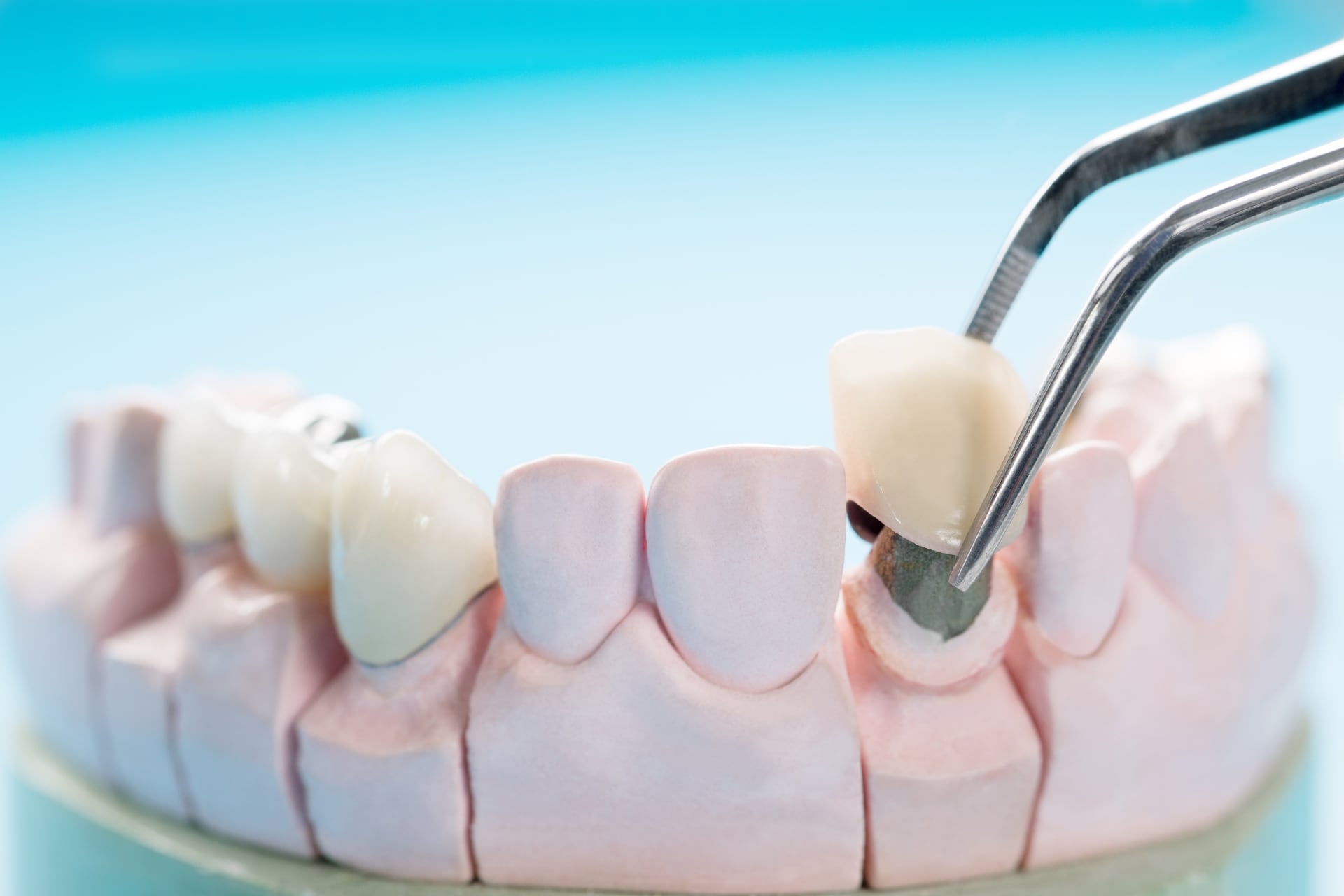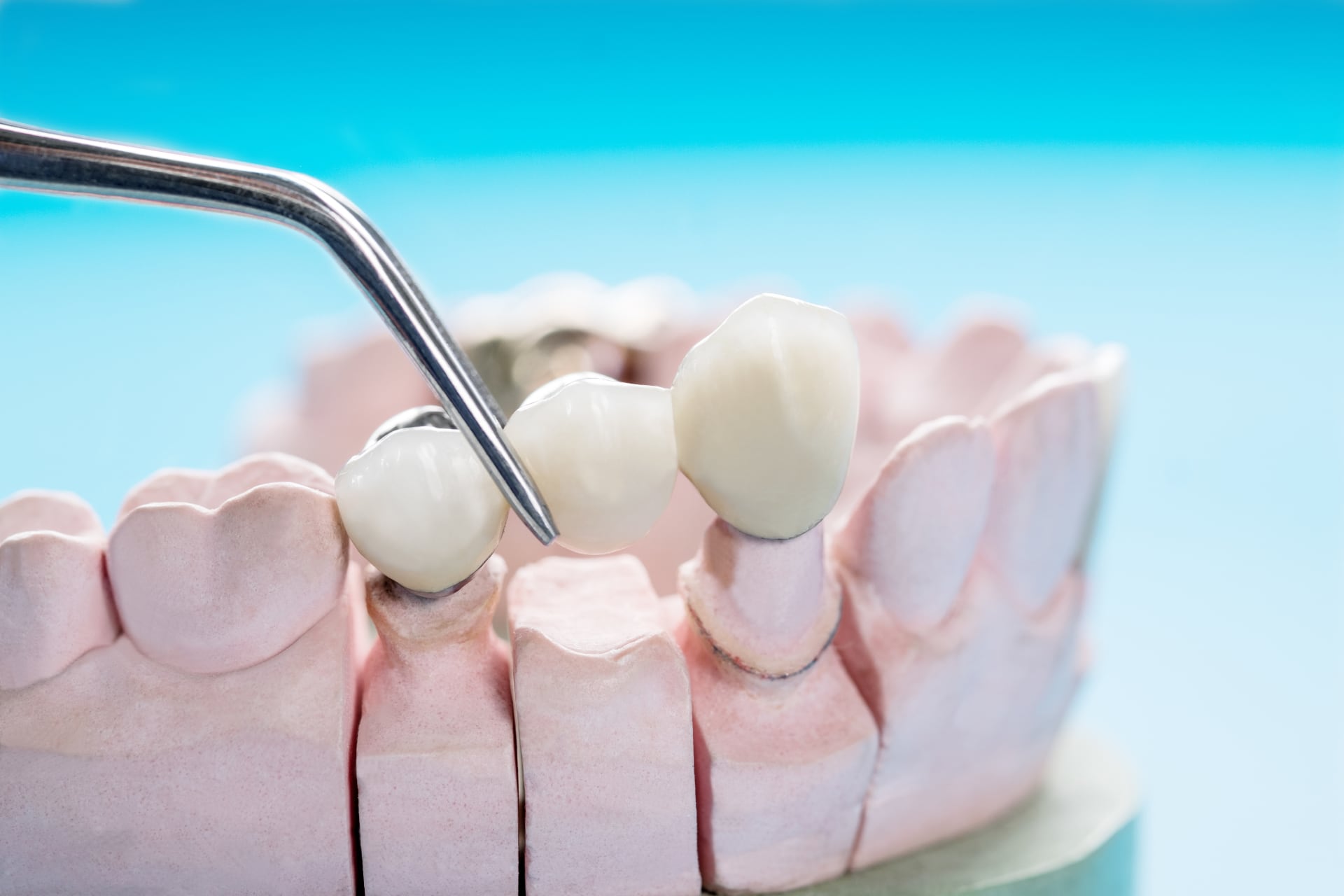A dental crown is an artificial tooth supplementary where the visible part of a tooth is completely covered and optically and functionally perfectly restored.
A dental crown is used when tooth decay or an accidental injury has caused such profound damage to the tooth that a simple dental filling is no longer a possible treatment to restore function and aesthetics, but at the same time the root is stable enough to carry a crown.
It is also used as part of a dental bridge when a gap in the tooth needs to be filled and it can be built on both, natural and artificial tooth roots (implants).

What types of dental crowns do exist?
Which material to choose for your crown depends on which tooth is damaged, how stable the crown needs to be and what role the aesthetics play. There are three standard crowns, the metal-ceramic crown, the full ceramic crown and the zirconium crown.
Metal-ceramic crown
The fully veneered metal-ceramic crown consists of a metal framework and is covered with a tooth-colored ceramic layer. The big advantage of the metal-ceramic crown is its high stability and long durability. Metal-ceramic crowns can look just like real teeth, the metal is not visible, although the transparency in strong light differs slightly from real teeth because of the metal in the inside.
All-ceramic crown
An all-ceramic crown is made exclusively of ceramic. Since ceramic is not as break-resistant as metal, ceramic crowns usually have to be made a little thicker and therefore larger parts of the natural tooth have to be taken away during the preparation in order to create enough space for the crown.
The big advantage of the all-ceramic crown, however, is that it aesthetically fits the existing teeth wonderfully, also in terms of transparency.
Zirconium crown
The zirconium crown is the highest quality crown that can be used in a dental crown treatment. Thanks to the zirconium oxide framework, it is completely metal-free and can therefore also be used in case the patient has a metal allergy. The framework is manufactured using computer-controlled CAD-CAM technology, making it extremely stable, precise and resilient.
Other advantages of the zirconium crown
- outstanding, clinically documented quality
- high aesthetics – transparent appearance like natural teeth
- high body tolerance – use of high-quality raw materials
- no gray gum line
- breaks less often under heavy loads than other crowns
- insulates well from cold and heat
- very durable
How long does a crown last?
The main question regarding durability is what material the crown is made of, whether oral hygiene rules are adhered to and whether the patient smokes. In general, crowns are designed to last approximately 15 years, but well-maintained crowns can last 20 years and more without discoloration.
It cannot be emphasized enough that proper oral hygiene is the foundation for the long life of crowns. At the FlyDent Clinic you will receive all the important information regarding oral hygiene.
Advantages of dental crowns
- Fixed solution
- Teeth destroyed by tooth decay can be saved
- Protects teeth from renewed caries
- Permanent solution
- Feels like natural teeth
- Depending on the function, resistant (zirconia in the molar area) or highly aesthetic (all-ceramic in the front area) or both.
- Can anatomically imitate the original tooth one-to-one, both in shape and color
- Appears very natural
- The tooth structure must be reduced, but can be retained
Disadvantages of dental crowns
- For bridges, healthy teeth may need to be reduced
- Improved hygiene is very important, bacterial attacks can cause inflammation and sensitivity
- Once the crown’s lifespan has expired, the original teeth must be further reduced for creating new dental crowns.
Here’s how you can extend the life of your crowns
Only with regular care can your crown achieve its maximum lifespan.
In addition to brushing teeth every day, one should also use a dental floss or an interdental brush to clean the spaces between the teeth.
The edge of the crown where it meets the gums needs to be particularly cared for, as inflammation can easily develop at those spots due to the bacteria that accumulate there.

How much do the crowns cost?
In order to be able to calculate the costs for the complete crown treatment, precise therapy planning must first be carried out. This can take place based on an x-ray, an existing dental treatment plan or a physical examination.
You are welcome to have a free consultation with our chief dentist Dr. Alexander Schreiner. Please use this link.
After a careful preliminary examination, the doctor discusses all the options with the patient and all suitable types of crowns are considered whereby the position of the teeth, the load upon them and the general lifestyle are the key aspects of choice.
Once the decision is made, preparation of the treatment can begin. After local anesthesia, the teeth are reduced, an imprint is taken and after the preparation the teeth are immediately provided with short-term temporary crowns.
The appropriate color is selected together with the patient, while the dental crowns are made in the laboratory. The laboratory applies different procedures depending on the type of crown. After several fittings in different stages, the crowns are adjusted precisely at the end.
The temporary crowns cost £20 (25€).
The cost of the final crowns is as follows:
Metal ceramic crown: £220 (260€)
All-ceramic crown: £345 (410€)
Zircon crown: £330 (390€)
What is a dental bridge?
A dental bridge is used to close a smaller or larger gap between teeth. The bridge can be attached to existing teeth or to dental implants. The combination of both is not recommended, as the natural movement of original teeth can cause the artificial root (dental implant) to loosen.
For most people, a smile without missing teeth is an essential part of a good appearance. But in addition to external appearance, a complete set of teeth is also an important part of our health. A bridge can fully restore the chewing function.
A bridge, as the name suggests, bridges one or more gaps. The bridge therefore extends from a healthy neighboring tooth across the gap to the next healthy tooth or from one implant to the next implant. This bridge is usually cemented to the teeth to the right and left of the gap with a special cement or glued with a plastic. Therefore those teeth have to be involved and prepared even if they are fully healthy and otherwise wouldn’t need such a treatment. Any tooth can be used as a pillar for the bridge as long as the root is strong and healthy enough to meet the conditions needed for a dental crown.
Depending on the number of teeth used, we speak of at least a three-unit bridge up to a total bridge, when all teeth are completely crowned or bridged, usually consisting of 12 tooth elements.

What materials is the dental bridge made of?
Dental bridges are actually a series of connected crowns, so the same answers apply to this question as for crowns. The dental bridges can also be made from metal-ceramic, zirconium and all-ceramic.
Some requirements
- For each bridge tooth there must be 2 pillars, i.e. stable and straight tooth roots or implants.
- We do not recommend dental bridges at a young age, as the teeth can still change anatomically overall, which can have an impact on the dental bridge.
Advantages of dental bridges on natural teeth
- no complicated procedure
- long durability
- no surgery required
- no great effort
- can be much cheaper than implant treatment
Disadvantages of dental bridges
- neighboring teeth must be grinded down
- only possible if the abutment teeth are somewhat parallel to each other
- the larger the gap, the less resilient the bridge
- can cause an overload of the adjacent teeth
Dental bridge costs
A dental bridge can be made much cheaper in Hungary than in the UK.
The lower price does not affect the quality, it simply reflects the lower overhead and labor costs in Hungary. The price of a bridge depends on the number of teeth to be replaced and the material chosen.
At the FlyDent Clinic, a three-unit metal-ceramic bridge costs £660 (780€) the same made of metal-free zirconium costs £990 (1170€).

